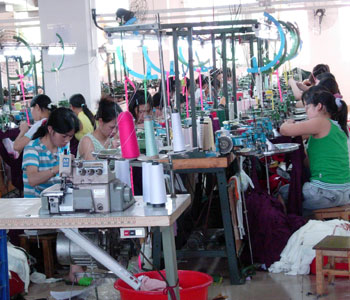Chinese Labor Rights Debated
By Tim Costello, Brendan Smith, Jeremy Brecher, and Catherine Gelb
A recent report by Global Movement Strategies asserts that U.S.-based global corporations—including Wal-Mart, Google, UPS, Microsoft, Nike, AT&T, and Intel—have been acting through U.S. business organizations, including the American Chamber of Commerce in Shanghai and the U.S.-China Business Council, to oppose legislation that would grant new rights to Chinese workers.
Three authors of the report recently presented its contents in a commentary at Foreign Policy in Focus, drawing a response from a representative of the U.S.-China Business Council. The authors then followed up on the response.
Japan Focus presents the commentary, the response from the U.S.-China Business Council spokesperson, and the authors’ follow-up. The report on which the debate is based can be found here. Links given in the text are as they appeared in the original.
Commentary: Labor Rights in China
By Tim Costello, Brendan Smith, and Jeremy Brecher
A major debate is underway in China on a proposed law that would grant new rights to Chinese workers. The debate has not been widely reported outside of China; until recently it has been almost entirely ignored by media in the United States. But when the Chinese government opened a 30-day public comment period this spring, it received nearly 200,000 comments, the majority from ordinary workers. But some comments also came from big U.S.- and European-based global corporations and their lobbying groups. These powerful forces squarely opposed the new law.
Wal-Mart’s recent agreement to recognize unions in China has made headlines worldwide. But Wal-Mart and other corporations, including Google, UPS, Microsoft, Nike, AT&T, and Intel, have acted through the American Chamber of Commerce in Shanghai (AmCham) and other industry associations to try to block Chinese legislation that would significantly increase the power and protection of workers.

This corporate campaign contradicts the justifications that have been given for public policies that encourage corporations to invest in China. U.S.-based corporations have repeatedly claimed to be raising human and labor rights standards abroad. For example, the American Chamber of Commerce in Hong Kong asserts among its “universal principles” that “American business plays an important role as a catalyst for positive social change by promoting human welfare and guaranteeing to uphold the dignity of the workers and set positive examples for their remuneration, treatment, health, and safety.” But U.S.-based corporations are trying to block legislation designed specifically to improve the remuneration, treatment, health and safety, and other standards for Chinese workers.

At a time when China exerts a growing impact on the global economy, efforts to improve the conditions of Chinese workers are profoundly important for workers everywhere. As U.S. wages stagnate, many Americans worry that low wages and labor standards in China are driving down those in America. Improving labor conditions in China can thus help workers in the rest of the world resist a race to the bottom that threatens to bring global wages and conditions down to the level of the least protected.
China’s proposed legislation will not eliminate its labor problems. The law will not provide Chinese workers with the right to independent trade unions with leaders of their own choosing and the right to strike. But foreign corporations are attacking the legislation not because it provides workers too little protection but because it provides them too much. Indeed, the proposed law may well encourage workers to organize to demand the enforcement of the rights it offers. And the prospect of independent, organized labor in China has pushed corporations to do some organizing of their own.
Corporate Campaign
The Chinese government released its Draft Labor Contract Law, whose proclaimed purpose is to protect workers’ rights and interests, in April. The corporate campaign against the law began soon after, spearheaded by three major organizations representing foreign corporations operating in China: the American Chamber of Commerce in Shanghai (representing over 1,300 corporations, including 150 Fortune 500 companies), the U.S.-China Business Council (representing 250 U.S. companies doing business across all sectors in China), and the European Union Chamber of Commerce in China (representing more than 860 members). All three have sent the Chinese government extensive attacks on the proposed law. The statement of AmCham in Shanghai runs to 42 pages.

These organizations have also issued barely veiled threats that foreign companies will leave China if the new legislation is passed. According to AmCham comments on the draft legislation, the law may “reduce employment opportunities for PRC workers” and “negatively impact the PRC’s competitiveness and appeal as a destination for foreign investment.”
“Business is attracted to China not only because of its labor costs but also because of its efficiency,” states Dr. Keyong Wu, an expert for the British Chambers of Commerce. “If regulation starts to affect that and flexibility, then companies could turn to India, Pakistan, and South-East Asia.”
American corporations have so much affection for the status quo in China that they have gone out of their way to preserve current Chinese labor law. As the AmCham document proclaims, that labor law has “significantly promoted standardized operation of enterprises and establishment of modern enterprise system.” AmCham criticizes the proposed changes in the law for making it harder to fire workers and for “rigid” restrictions on “business administration of enterprises,” and concludes that “we doubt whether it is necessary to carry out such significant changes.”
Why the Opposition?
The extraordinarily rapid growth of the Chinese economy has depended a great deal on foreign corporations. According to Morgan Stanley’s chief economist Stephen Roach, 65% of the tripling of Chinese exports—from $121 billion in 1994 to $365 billion in mid-2003—is “traceable to outsourcing by Chinese subsidiaries of multinational corporations and joint ventures.” [1] The export surge blamed on China is primarily an export surge of global corporations using low-wage Chinese workers. Foreign corporations thus fear that the law protecting Chinese workers may eliminate their cheap labor costs.
Foreign corporations have another, less obvious, motive for opposing protections for Chinese workers. The ability to hire cheap labor in China has put downward pressure on wages and workers’ conditions around the globe. China plays a key role in setting global wage norms. It is the linchpin of what Morgan Stanley chief economist Stephen Roach has called “global labor arbitrage” in which corporations move from one labor market to another to take advantage of cheaper labor. The result is a global “race to the bottom” in which workers and their communities are put into competition with each other to see who can provide the lowest-cost labor and the most corporate-friendly conditions. According to Roach, this global labor arbitrage is also now acting as “a powerful structural depressant on traditional sources of job creation in high-wage countries such as the United States.” [2]

China’s downward pressure on the world’s wages is enormous. Harvard economist Richard Freeman estimates that the entry of India, Russia, and China into the world economy in the past few decades has doubled the workforce employed in the global economy. China alone accounts for 50% of this increase. And because these countries did not add significant capital to the global economy, more workers are competing to be employed by essentially the same amount of capital. This unbalanced equation has increased the bargaining power of capital, decreased that of labor, and substantially contributed to wage stagnation or decline in countries around the world. Chairman Ben Bernanke of the Federal Reserve Bank recently stated that the rapid integration of China, India, and the former Communist bloc into the world’s economy in the space of a just a couple of decades has “no historical antecedents.” [3]
Andrew Ross of New York University, who recently spent a year in China studying how workers are coping with the rapid changes of the last decade, notes that foreign corporations can use the wages and working conditions in their Chinese operations to drive down labor conditions for workers at all levels worldwide:
No industrializing country has been able to compete for the top-end slot at the same time as it absorbs jobs lower down the production chain … To command this spread—from the lowest assembly platform work to the upper reaches of industry and services—is to be in a position to set the global norm for employee standards as never before. Given the chronic disregard for job security and workplace rights in China’s foreign-invested private sector, such a norm is a clear threat to the stability of livelihoods everywhere. [4]
U.S. Responses
The exposure of the role of U.S.-based businesses in trying to block new rights for Chinese workers—in a report by Global Labor Strategies—has struck a responsive chord. A front-page article in The New York Times, drawing largely on the report, triggered a widespread discussion in the media, on blogs, and throughout the labor movement.
Members of the U.S. Congress quickly stepped forward to address the concerns raised by the report. U.S. Representatives Lynn Woolsey (D-CA), Barbara Lee (D-CA), George Miller (D-CA), Barney Frank (D-MA), and 23 other House members sent a letter to President Bush “protesting the efforts of U.S. corporations to undermine the most basic human rights of Chinese workers and block proposed new worker rights and labor standards protections in the proposed new Chinese labor law.”
According to Lynn Woolsey, “We are appalled that the American Chamber of Commerce in China and some of America’s most-prestigious, brand-name corporations are leading efforts inside China to weaken, if not block altogether, significant worker rights and protection provisions in the proposed Chinese labor law. This shameful lobbying campaign is totally inconsistent with our country’s long-standing commitment to promote respect for fundamental worker rights in law and practice everywhere. It is challenging enough for hard-working Americans to compete in the new global economy without having U.S. corporate leaders seeking to play them off against the least-protected and lowest-wage workers in the world.”
Specifically, the congressional letter calls upon President Bush to instruct the U.S. ambassador in China and the U.S. Trade Representative to deliver letters to Chinese government officials in support of worker rights and protection provisions in the Draft Labor Contract Law; repudiate the efforts of any U.S.-based corporations and their representatives doing business in China to weaken such provisions; and urge pertinent U.S.-based corporations and their representatives doing business in China to reverse their opposition and make clear their commitment to the universal rights of all Chinese workers and to improve their working conditions and living standards.
Both major U.S. trade union federations, the AFL-CIO and Change to Win, are planning to make the opposition of U.S. corporations to expanded rights for Chinese workers a significant focus of attention in upcoming political battles over the response to globalization.
Linking Workers
The spread of globalization brought U.S. companies to China. The media has often focused on how the Chinese government was suppressing workers’ struggles and not enforcing existing labor law. But in a globalized world, the Chinese government is no longer the only or even the major actor in this regard. Global corporations or their subsidiaries and suppliers are exploiting millions of Chinese workers. Indeed, nearly two-thirds of the increase in “Chinese” exports actually represents non-Chinese corporations and their subsidiaries and suppliers.
Public policy in the United States and other countries has allowed these corporations to realize immense benefits from the low pay and poor conditions under which their Chinese workers work. These policies have been justified largely on the grounds that foreign corporations operating in China would elevate labor and human rights standards.
But these corporations have not raised the standards. And it is, ironically, the Chinese government that now wants to improve the situation, albeit in incremental ways. By opposing a labor contract reform law that would elevate labor and human rights standards, American and other foreign corporations are aggravating the very conditions they claimed they would ameliorate. Their campaign against the law blocks protections for Chinese workers and continues protections for corporations that would exploit them.
China’s new labor bill faces a third reading this fall. If passed, it will come into full effect in March 2007. U.S., European, and other global corporations have already weighed in on the bill. They want it gutted.

Corporations and business organizations in China, and their political allies, should hold to their original promises to improve the conditions for Chinese workers. They should immediately reverse their opposition to the draft labor code and publicly support further legislation to ensure the basic human right of Chinese workers to organize, choose their own leaders, bargain collectively, and strike.
Here is an issue that links the interests of workers not only in the United States and China but everywhere. Higher wages, better working conditions, and the right to organize independent unions help workers everywhere to draw a line against the race to the bottom.
There is no need to travel to Beijing to fight for the rights of Chinese workers. The headquarters of the corporations opposing reforms for Chinese workers are in New York and Brussels, Los Angeles and London, and other cities and towns around the world. Washington, too, must make a choice. Will it support the rights of workers in China or the profits of U.S. corporations?
Notes:
[1] Stephen Roach, “How Global Labor Arbitrage Will Shape the World Economy,” Global Agenda, 2005 Edition.
[2] Stephen Roach, “False Recovery,” Global Economic Forum, Morgan Stanley, January 1, 2004.
[3] Krishna Guha, “Bernanke Calls for Fairer Globalization,” Financial Times, August 25, 2006.
[4] Andrew Ross, “A Fast Boat to China,” delivered at the Cornell Global Labor Conference on February 10, 2006. Ross is author of the book A Fast Boat to China: Corporate Flight and the Consequences of Free Trade; Lessons from Shanghai (Pantheon, 2006).
Tim Costello, Brendan Smith, and Jeremy Brecher wrote the report Behind the Great Wall of China for Global Labor Strategies.
Response: U.S. Companies Want Better Chinese Labor Law
By Catherine Gelb
The FPIF commentary (“Labor Rights in China” by Tim Costello, Brendan Smith, and Jeremy Brecher) mistakenly asserts that U.S. companies have launched a “corporate campaign” to “block” China’s proposed Labor Contract Law. Far from opposing the new measure, the U.S.-China Business Council, which represents 250 U.S. companies that do business in China, submitted comments on the draft Labor Contract Law to the Chinese government at its request that aim to make the new law more effective and balanced.
The U.S.-China Business Council and its members share the goal of creating a Chinese work environment that is safe, fair, and stable. The overwhelming number of labor abuses occur in locally owned companies that do not share the more advanced labor relations standards that American corporations bring with them when they come to China. That last point cannot be stressed enough—American companies by and large are models for improving employment and environmental health and safety standards in China.

The Chinese government’s request for comments on the draft law was a significant step forward for increased regulatory transparency in China. The airing of different views should be encouraged as a normal—and integral—part of the drafting process.
Catherine Gelb is the director of communications and publications at the U.S.-China Business Council.
Follow-up: A Response to the U.S.-China Business Council
By Tim Costello, Brendan Smith, and Jeremy Brecher
Our recent FPIF article was based on our Global Labor Strategies report Behind the Great Wall of China, which documented the opposition of U.S. and EU based corporations in China to a new law that would grant new labor rights to Chinese workers.
In the article, we identified the U.S.-China Business Council (USCBC) as one of the lobbying groups that submitted comments to the Chinese government opposing the new law. The U.S.-China Business Council is a Washington-based group that includes many of the biggest companies doing business in China and is generally considered an authoritative voice of U.S.-based corporate interests in China.
The USCBC took issue with our article. Of course, we welcome this comment by the U.S.-China Business Council. Debate over the proper role of U.S.-based businesses abroad is essential. Indeed, we wrote the article and the report upon which it is based to stimulate a debate and reappraisal of the political and business activities of U.S.-based firms around the world.
But we stand completely by what we wrote. In fact, our reporting on the position of USCBC on the new law was based entirely on comments submitted by the organization to the Chinese government. Those comments mirrored comments made by other corporate lobbying organizations like the American Chamber of Commerce and the EU Chamber of Commerce. As the law has worked its way through the Chinese legislative process, lobbying organizations have made additional comments and they continue to apply pressure to change the proposed law before it is adopted.
First, a little background. When the draft law was made public in the spring of 2005 the Chinese government invited comments from interested parties. They received nearly 200,000 comments. Most were from ordinary people in China. But some were from organizations like the American Chamber of Commerce, the EU Chamber of Commerce, and the U.S.-China Business Council.
The law itself was prompted by a massive wave of strikes and civil disturbances. Its aim seems to be to respond to the threat of social instability by setting some basic labor standards and regulations in China’s chaotic labor markets. The result is a modest, but real, step in the direction of providing China’s workers some of the same rights and standards common in most industrial societies.
The USCBC argues that “[t]he overwhelming number of labor abuses occur in locally owned companies that do not share the more advanced labor relations standards that American corporations bring with them when they come to China.” In point of fact, the USCBC opposes the adoption of a host of commonly accepted “advanced labor relations standards”—standards that would apply to both foreign-based firms and the (often) Chinese-owned businesses that comprise the supplier chains of many U.S. corporations.
The draft labor law runs about 23 pages in English and contains 65 articles. The comments of the USCBC identified half a dozen or so key areas to which it took exception. But these areas represent the heart of the law.
Here are some of the provisions that they objected to. For a complete text of the comments submitted by the USCBC, click here.
Non-compete Agreements and the Freedom to Change Jobs
Non-compete agreements are a regressive feature of U.S. and other western systems that have crept into the Chinese economy. They are especially common in high skilled jobs. They prevent workers from changing jobs easily if they have access to proprietary knowledge as determined by an employer. For a developing economy like China, knowledge transfer is essential. The USCBC objected to the draft law’s regulations on non-compete agreements including its cap on damages that a firm could collect from a worker who leaves one job for another job and restrictions on non-compete agreements when a worker leaves a job and moves to an entirely different part of the country.
Limited Probationary Periods
Currently corporations can set probationary periods unilaterally, often for an entire year, keeping people in a highly precarious employment status. This is a major problem for workers since it leaves them with little or no protections. The new law sets standard probationary periods of from one to six months depending on the type of job. The USCBC argues against limiting the probationary period from one to six months because it “[will make] it more difficult for employees and employers to properly evaluate the work relationship.” Instead, it should therefore be left to the sole discretion of employers to set probationary periods for all employees—including the most unskilled—for up to six months.
Payment for Training
Under current practice employees sign a separate contract that allows companies to recover any training costs if a worker terminates his/her employment. Under current law almost anything that management considers “training”—including many of the kinds of on-the-job training that are standard for any new job—can be subject to re-payment, leaving a departing worker either in debt or, if unable to repay the training expenses, bonded to his/her current employer. The new law limits costs employers can recover by, for instance, defining “training” as instruction that takes place “off-the-job,” on a full-time basis, and lasting for at least six months. The USCBC opposes the new law because “the employer would not be entitled to claim compensation from the departing employee for [on-the-job and other types] of training experiences.”
Severance Payments
There is theoretically no at-will employment in China; all workers are supposed to have labor contracts—although in practice many do not. Most contracts are for a “fixed term,” after which an employer can dismiss a worker without penalty and a worker can leave without penalty. This system encourages highly unstable employment relationships. The proposed draft law encourages stable employment by requiring employers to provide severance pay to workers whose contracts end, but not to those whose contracts are renewed. The USCBC opposes this provision.
Limits on Temporary Work
Chinese companies employ a large number of temporary workers hired through temp agencies. Temporary work encourages management to avoid the protections and commitment that come with standard employment. Under the new law, temp agency workers would become permanent employees after one year of employment at a client firm, thus reducing the number of insecure, contingent jobs. According to the USCBC, “This stipulation impedes the right of the employer to find the best person for the job and will reduce the flexibility of human resource allocation.”
Negotiations on Lay-offs
In practice corporations frequently lay off workers at their own discretion. Under the new proposals, corporations would have to negotiate the terms of any lay-off of more than 50 people with the union or representatives of the workers. The USCBC opposes this provision.
Expanded Collective Bargaining
The new law provides for negotiations over workplace policies and procedures, lay-offs, health and safety, and firings with a union or an “employee representative.” Foreign corporations demand unilateral authority, not negotiation. The USCBC writes, “It is not feasible to state that an employer’s regulations and policies shall be void if they are not adopted through negotiation with the trade union…. Requiring the consent of the trade union before such changes can be made is overly burdensome and may prevent important company policies from being implemented in a timely manner…. Final authority and responsibility for company policies should rest in the hands of the employer.”
If the USCBC and other organizations representing global companies really wanted “to make the new law more effective and balanced” there are plenty of suggestions they could have made. For instance, the law says nothing about expanding the rights of workers to organize and bargain with employers through representatives of their own choosing—rights guaranteed under U.S. and international labor law. Instead, they chose only to oppose key provisions of the new law.
Tim Costello, Brendan Smith, and Jeremy Brecher wrote the report Behind the Great Wall of China for Global Labor Strategies. They also publish a blog.
The commentary “Labor Rights in China” appeared at Foreign Policy in Focus on December 21, 2006; “U.S. Companies Want Better Chinese Labor Law” and “A Response to the U.S.-China Business Council” appeared on February 8, 2007. These items were posted at Japan Focus on February 20, 2007.



